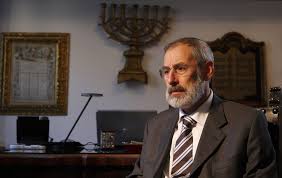Interview with Rabbi Riccardo Di Segni, Chief Rabbi of Rome
By Jacques Roumani
(Translated by Judith Roumani)

Much has happened with regard to the situation of the Jews in Europe – a deterioration, in fact, since your lecture on the subject two years ago at the Sephardic Synagogue in Washington DC, Magen David Sephardic Congregation. Now, in light of alarming trends in Europe, including recent terror attacks in Paris and Copenhagen,
i) What do you think European governments should do more (besides providing armed protection to Jewish institutions) to prevent manifestations of anti-Semitism?
They ought to recognize the reality, first of all. Governments are pretending not to understand that parts of their national territory are actually dominated by non-integrated immigrant populations, and are outside the control of the police and institutions representing the state. We are confronted with a new kind of denial, a negation of what is happening in France and in other states of northern Europe. Areas without state control constitute a problem of public order, but if within them people are preaching hatred of the society and in particular hatred against Jews, they are a very dangerous breeding ground.
ii) Are there examples or lessons to be learned from the Italian experience in dealing with anti-Semitism?
Italian governments have for a long time been attentive and responsive in protecting Jewish institutions like synagogues and schools, and some leaders have received personal protection. Perhaps the relatively small number of places and persons needing protection has allowed this effort, which in other countries would have had to be on a much larger scale. In any event, the need for protection is a lesson that many other governments are now learning.
iii) The French Education Minister, Najat Vallaud-Belkacem, together with the Ministry of Culture, has proposed some proactive measures together with the Ministry of Culture to enhance democratic (republican) values and cultural acceptance in French schools, such as involving members of civil society (lawyers, artists, etc…) to directly assist teachers as real-life resources in the classroom, as needed, through a program such as http://www.lareservecitoyenne.fr. Do you think this kind of “counter radicalization” program will work? Would it be replicable in Italy?
We have to try every possible medium for education and prevention. Communicating through television and now social networks is essential. It is on social networks that the worst expressions [of anti-Semitism] are now emerging. But these are widespread phenomena that require considerable resources and expertise to handle effectively. It is really difficult to respond to everyone who participates in a particular blog.
iv) What can the Muslim community in Italy do more to stop radicalization of Muslim youth and help fight anti-Semitism?
There is no single Muslim community in Italy. I do not know what the diverse animators of the vast Muslim galaxy are doing to combat radicalization, beyond formal condemnations that not all of them have even made.
v) What can Catholic organizations in Italy do more to help fight anti-Semitism?
Catholic organizations can combat the religious component in anti-Jewish hostility, which is still rooted in many sectors. Tremendous work has been done, but there is still much to do.
vi) Shouldn’t interfaith dialogue – Jewish-Catholic-Muslim – focus now on combating anti-Semitism as a priority?
There has always been interfaith dialogue with Christians, but with Muslims it’s a more difficult question, because for them (among those who are willing to dialogue) there is also another side of the equation, which is the struggle against islamophobia.
vii) Given their preponderant influence at home, education and child rearing, and their ever increasing influence in the professions, how can women from all strata of society and different ethnic groups contribute to combating anti- Semitism and violent extremism? Are there lessons to be learned here from the successful (feminist) strategies to combat millennial prejudices against women in Western society?
The ways in which women’s rights have been promoted politically can serve as a model for organizing among women in the pursuit of a common goal. It is very important for women of different cultures and origins to meet for discussion and the struggle for common goals. Such collaboration is a powerful tool in combating reluctance. But on the specific questions addressed by feminists, we have to bear in mind that the cultural models that religions propose are very different and can themselves become a source of tension.
viii) Do you think that anti-Zionism (anti-Israel attitudes) among members of the political class and of the cultural elite is an alibi for anti-Semitism? At an informal meeting of the UN General Assembly on January 22, 2015, the Secretary General stated: ”We must also avoid another trap involving the Middle East conflict. Grievances about Israeli actions must never be used as an excuse to attack Jews. In the same vein, criticisms of Israeli actions should not be summarily dismissed as anti-Semitism.”
Do you agree?
Obviously one can criticize a particular [Israeli] government without being an anti-Semite. But often the person who makes this argument slides into much more general questions, and has actually never liked any Israeli government. The distinction can be very subtle, and it can become just an alibi.
